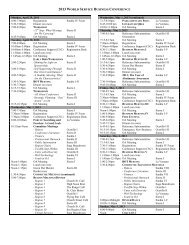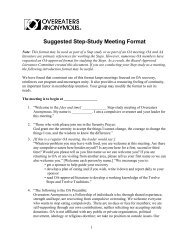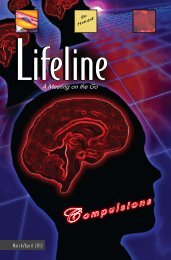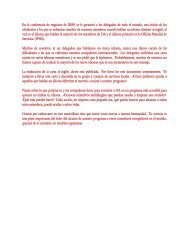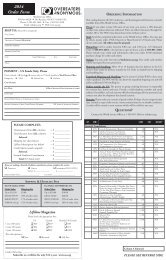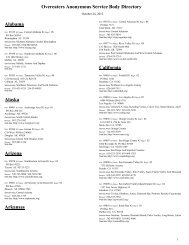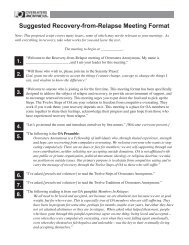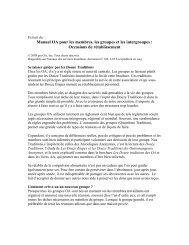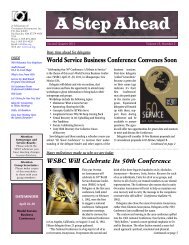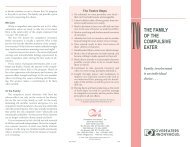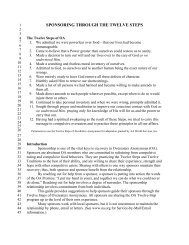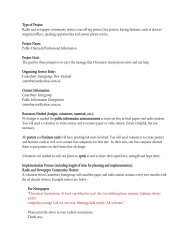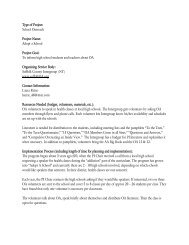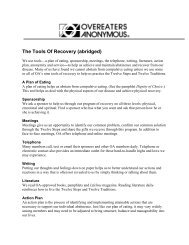A Common Solution.pdf - Overeaters Anonymous
A Common Solution.pdf - Overeaters Anonymous
A Common Solution.pdf - Overeaters Anonymous
You also want an ePaper? Increase the reach of your titles
YUMPU automatically turns print PDFs into web optimized ePapers that Google loves.
1<br />
2<br />
3<br />
4<br />
5<br />
6<br />
7<br />
8<br />
9<br />
10<br />
11<br />
12<br />
13<br />
14<br />
15<br />
16<br />
17<br />
18<br />
19<br />
20<br />
21<br />
22<br />
23<br />
24<br />
25<br />
26<br />
27<br />
28<br />
29<br />
30<br />
31<br />
32<br />
33<br />
34<br />
35<br />
36<br />
TABLE OF CONTENTS<br />
Introduction<br />
Program Diversity<br />
Mutual Acceptance<br />
A COMMON SOLUTION:<br />
DIVERSITY AND RECOVERY<br />
Telephone Meetings: Diversity Around the World<br />
One Answer, Many Paths<br />
Cultural Diversity<br />
Embracing Cultural Diversity<br />
Poverty Is No Barrier<br />
Three Cultures, One Home<br />
Jewish Lesbian Finds a Home in OA<br />
Twisted Symbol of Love<br />
Found OA Through a Mexican Posada<br />
Recovering in a Non-English Speaking Country<br />
Sexuality and Gender Diversity<br />
Life Diversity<br />
Sexual Orientation and Working the Program<br />
One Gay OA Experience<br />
Being a Man in OA<br />
Dear Son…<br />
Different Ages, Like Minds<br />
An Anorexic Perspective<br />
Males Can Be Anorexics Too<br />
Taking My Medicine<br />
My Appetite: the Best Part of Me<br />
Bipolar and an Honest Program<br />
Pregnant and Abstinent<br />
The Twelve Steps of OA<br />
The Twelve Traditions of OA
37<br />
38<br />
39<br />
40<br />
41<br />
42<br />
43<br />
44<br />
45<br />
46<br />
47<br />
48<br />
49<br />
50<br />
51<br />
52<br />
53<br />
54<br />
55<br />
56<br />
57<br />
58<br />
59<br />
60<br />
61<br />
62<br />
63<br />
64<br />
65<br />
66<br />
67<br />
68<br />
69<br />
70<br />
71<br />
72<br />
73<br />
74<br />
75<br />
76<br />
77<br />
78<br />
INTRODUCTION<br />
As <strong>Overeaters</strong> <strong>Anonymous</strong> grows, our Fellowship becomes more diverse. The AA Big Book<br />
observes, “We are people who normally would not mix” (Alcoholics <strong>Anonymous</strong>, 4 th ed., p 17). Yet<br />
mix we do, under the wisdom of Tradition One that reminds us “personal recovery depends upon OA<br />
unity.”<br />
We share a common problem of compulsive eating and compulsive food behaviors, and<br />
together we seek a common solution—recovery. The stories in this pamphlet illustrate how OA<br />
members have found recovery amid the diversities of program, culture, gender and sexuality, and life.<br />
Our stories disclose that within our diversities—sometimes because of them and sometimes<br />
despite them—we have found a solution that works for us: practicing the Twelve Steps of <strong>Overeaters</strong><br />
<strong>Anonymous</strong>. By working together, we find unity in diversity and gain recovery.<br />
We hope you are able to identify with and learn from these stories and to find hope for your<br />
own recovery from this disease.<br />
PROGRAM DIVERSITY<br />
While the Twelve Steps of <strong>Overeaters</strong> <strong>Anonymous</strong> show the path to recovery from<br />
compulsive eating, a visit to any OA meeting will show ways of working the Steps that vary<br />
significantly. How can this be?<br />
“<strong>Overeaters</strong> <strong>Anonymous</strong> has no opinion on outside issues . . .” (Tradition Ten of <strong>Overeaters</strong><br />
<strong>Anonymous</strong>). Working the Steps is the only path to recovery that OA endorses. Each member decides<br />
when and how he or she will work the Steps, usually with the guidance of a sponsor. Sponsors share<br />
their experience of working the Steps, and this experience varies widely. Some members recover with a<br />
very structured program, abiding by strict sponsorship, while others benefit from a more flexible<br />
approach. What works for some may not work for others. The Twelve Steps and Twelve Traditions of<br />
<strong>Overeaters</strong> <strong>Anonymous</strong>, The Twelve-Step Workbook of <strong>Overeaters</strong> <strong>Anonymous</strong>, and the AA Big<br />
Book are our guiding texts.<br />
Specific eating plans are considered outside issues and therefore are not cited in meetings. OA<br />
addresses this issue in the pamphlet Dignity of Choice and suggests that members may want to consult<br />
a nutritionist or medical professional to develop plans appropriate for their individual health situations.<br />
Compulsive eating can manifest itself in many ways: overeating, bingeing, grazing, bulimia or<br />
anorexia; but we have a common solution in the Twelve Steps. The following stories illustrate the<br />
diversity of program approaches to recovery from compulsive eating.<br />
Mutual Acceptance<br />
Three years ago, I moved to a neighboring state from a state where I had been actively<br />
involved in OA for more than two years. I loved the meetings in my old state. I knew many people,<br />
held many service positions, and was involved in the intergroup. It was hard starting from scratch with<br />
a new OA community. What was worse, this new community did everything wrong (that is, different<br />
2
79<br />
80<br />
81<br />
82<br />
83<br />
84<br />
85<br />
86<br />
87<br />
88<br />
89<br />
90<br />
91<br />
92<br />
93<br />
94<br />
95<br />
96<br />
97<br />
98<br />
99<br />
100<br />
101<br />
102<br />
103<br />
104<br />
105<br />
106<br />
107<br />
108<br />
109<br />
110<br />
111<br />
112<br />
113<br />
114<br />
115<br />
116<br />
117<br />
118<br />
119<br />
120<br />
from what I was used to). I constantly compared my old meetings to the meetings in my new town.<br />
They (the people in the new meetings) sat in rows facing the front; we (the people at my old<br />
meetings) sat in a circle. They stayed seated while saying the closing prayer; we stood and held hands.<br />
They had suggested lengths of abstinence for speaking; we allowed anyone to speak. The most<br />
shocking difference of all was that they all followed the same strict food plan, while we encouraged<br />
members to find individual food plans that worked for them.<br />
I felt unaccepted. I couldn’t find a sponsor who would take me while I followed my old food<br />
plan. I discovered later that their sponsors forbade some people from calling me. I was outraged! How<br />
dare they judge me this way? What happened to “principles before personalities”? But when I was<br />
honest, I had to admit I was doing as much judging as they were, if not more. I was driving an hour<br />
back to my old meetings and complaining about “those people.” I dismissed anything said by anyone<br />
who followed “that food plan.” I refused to participate actively in the meeting. I tried to convert<br />
people to my way of thinking. I was contributing as much as anyone in any of the meetings to my<br />
feeling of being cast out and rejected.<br />
Then, because of an injury, I was unable to make the hour-long drive to my old meetings. I<br />
knew I had to make the new OA meeting my home, because I had learned long ago there was nowhere<br />
other than OA for me to go. So I opened my mind. I started listening to what “those people” said and<br />
discovered that many of them said wise and insightful things I needed to hear. I discovered that<br />
following the same food plan doesn’t make people all the same. Instead of trying to convert people, I<br />
started sharing honestly at meetings about everything, including food and food plans.<br />
And a funny thing started happening: as I became more accepting of other people, they<br />
became more accepting of me. People started asking me to qualify at meetings. People called me.<br />
People asked me to sponsor them. People shared with me that they had also felt like outcasts because<br />
they didn’t follow the food plan, and they were grateful I had the courage to say so in front of the<br />
group. People told me they had never realized that it was possible to successfully do OA a different<br />
way. It was a wonderful, mutual process. I changed them, they changed me, and we all ended up the<br />
better for it.<br />
Now I’m moving back to my old town, and I will genuinely miss this OA community. But I<br />
am looking forward to the chance to share with my old groups all that I learned by opening my mind<br />
to a new community.<br />
— Lifeline, September 2004<br />
Telephone Meetings: Diversity Around the World<br />
I’m a 100-pound (45-kg) loser and senior citizen, living in a rural coastal area in the United<br />
States, and I am grateful that HP introduced me to OA telephone meetings. Every day I attend at least<br />
one telephone conference meeting and get to hear experience, strength and hope from OA members<br />
across the United States and around the globe. I’ve listened and shared with a teacher in Israel;<br />
graduate students in Korea, Spain and England; a young wife in Panama; a woman in Australia;<br />
multiple Canadians; soldiers on field-training maneuvers; a scientist in an isolated part of a Navajo<br />
reservation; mothers nursing infants inside New York City apartments (child noises are not considered<br />
unwanted background sounds in OA phone meetings); and members phoning from sheep and horse<br />
barns somewhere on the great plains.<br />
3
121<br />
122<br />
123<br />
124<br />
125<br />
126<br />
127<br />
128<br />
129<br />
130<br />
131<br />
132<br />
133<br />
134<br />
135<br />
136<br />
137<br />
138<br />
139<br />
140<br />
141<br />
142<br />
143<br />
144<br />
145<br />
146<br />
147<br />
148<br />
149<br />
150<br />
151<br />
152<br />
153<br />
154<br />
155<br />
156<br />
157<br />
158<br />
159<br />
160<br />
161<br />
162<br />
Several members phone while commuting to work. I can sit in my small Pacific Northwest<br />
coastal cabin and listen to New York City subway doors open and close as a fellow tells how he<br />
handles his food cravings. A traveling clergyman calls from highway rest stops to share about making it<br />
through the church potlucks he attends. One mother phones in on her morning walk and apologizes<br />
when her speech slows down while pushing a baby stroller uphill. A woman in Florida walks outside<br />
on her patio to speak while her sick husband sleeps undisturbed.<br />
These members are my family-of-choice. A woman in Sweden leads one of the meetings;<br />
another is often led by a forest ranger in a remote national park. Several leaders are legally blind and<br />
use adaptive vision aids to read the format; others are housebound due to physical limitations,<br />
including obesity. Some call from nursing homes, and many are full-time caregivers for disabled loved<br />
ones. Meetings have been held while leaders read the format by candlelight during electrical outages.<br />
We are a family of folks with food behavioral eating challenges. We are together, and we are equal.<br />
The conference calls are free, but not toll-free. My phone company offers a good monthly<br />
price for unlimited USA long-distance calls. I dial the conference number, give my pin (conference<br />
identification number), and voila! I’m at an OA meeting! Most members offer the option to exchange<br />
first names and phone numbers, and we phone each other after the meeting for outreach calls. Usually<br />
there is time after the meeting closes (called “the parking lot”) to chat with each other and ask<br />
questions. I’ve been told that two daily relapse meetings leave their parking lots open 24/7 for<br />
members to call before bingeing. This can be a lifesaving service. Some OA members from other<br />
countries use parking lots to chat with USA members by arranging a time to meet (similar to “meeting<br />
for coffee somewhere”) and avoid outside-the-country long distance expenses.<br />
Holiday phone marathons are a special bonus where meetings run all day for food-centered,<br />
emotionally challenging days. These telephone events are announced in the regular meetings, and fliers<br />
are emailed around.<br />
The coolest meeting I ever attended was a phone marathon meeting held from midnight to 1<br />
a.m., New Year’s Eve. Fifty-five OA members attended, and while more than half were in the new<br />
year, the rest of us were attending the same meeting in the old year! How is that for diversity!<br />
— J.Z., Seaview, Washington USA<br />
One Answer, Many Paths<br />
I came to OA five years ago and have been abstinent for the past year. Diversity in the OA<br />
meetings has made this possible. Although the groups in my city are different in their format,<br />
atmosphere and spirit, the same message is conveyed. The Twelve Steps are the answer to my disease<br />
of compulsive overeating.<br />
When I first joined OA, I couldn’t relate to the Big Book. I felt men had written it for other<br />
men. We women think differently and deal with problems differently. So I attended meetings that<br />
primarily used the OA “Twelve and Twelve.” Gradually, I began reading the Big Book, and some<br />
passages started to make sense to me. Still, the language in the OA “Twelve and Twelve” was gentler,<br />
and I could relate to it better. I decided to take what I needed and leave the rest.<br />
Four years into OA, I had reached a plateau and needed something else, but I didn’t know<br />
what it was. Then one day I heard a speaker talk about her need for more structure in her food plan<br />
and that HOW meetings had helped her. At first, I thought HOW groups took a drastic approach, but<br />
4
163<br />
164<br />
165<br />
166<br />
167<br />
168<br />
169<br />
170<br />
171<br />
172<br />
173<br />
174<br />
175<br />
176<br />
177<br />
178<br />
179<br />
180<br />
181<br />
182<br />
183<br />
184<br />
185<br />
186<br />
187<br />
188<br />
189<br />
190<br />
191<br />
192<br />
193<br />
194<br />
195<br />
196<br />
197<br />
198<br />
199<br />
200<br />
201<br />
202<br />
203<br />
the word “structure” made sense to me. For four years, I had struggled with my abstinence and<br />
couldn’t figure out what the problem was. After sharing with this speaker, I realized I had nothing to<br />
lose except more of the excess weight I had been carrying.<br />
A month later, I started the OA/HOW program with a new sponsor and did my first three<br />
Steps in 30 days. I had decided to commit for 30 days no matter what. It happened. The daily contact<br />
with my sponsor and the plan of eating I had received began unraveling the mystery behind my<br />
inability to stay abstinent. During this time, I found an old issue of Lifeline with an article about sugar<br />
and flour, and that put the last pieces of my puzzling disease together. I finally saw what my body had<br />
been trying to tell me. I had an allergy, not only to sugar, but also to white flour. I lost the cravings.<br />
What a blessing to know there is a solution.<br />
I feel strongly that God has made each of us different with different needs. Whether it’s the<br />
Big Book or the OA “Twelve and Twelve,” an individual plan of eating or the HOW plan of eating,<br />
we are all looking for the same solution to this disease of compulsive overeating. The solution is the<br />
Twelve Steps, but we take different paths toward healing. Since Higher Power is different for each of<br />
us, why should his will be the same for everyone? His will is an individual affair, just as our likes and<br />
dislikes are individual. Diversity in OA has made it possible for me to enjoy life more fully. Thank<br />
God, OA was there for me.<br />
— Lifeline, February 2005<br />
CULTURAL DIVERSITY<br />
Compulsive eating knows no geographic boundaries, speaks every language, and is no<br />
respecter of peoples, heredity, poverty or prosperity. Using the OA globe that divides the world into<br />
10 regions, a member can find many similarities and differences within and between the regions.<br />
Thus, some regions speak one national language while others require that OA literature be<br />
translated into five, 10 or even 35 languages. Within the same region, some cultures may experience a<br />
scarcity of food while others have access to nearly unlimited food. In addition, religious traditions<br />
often require navigating food and behavior choices. <strong>Overeaters</strong> <strong>Anonymous</strong> helps members find<br />
recovery through the Twelve Steps, regardless of cultural diversity. Further, culture happens all around<br />
us; whatever culture we are living within, our concern is to heal the disease inside us, to become<br />
abstinent, and to recover from compulsive overeating.<br />
When we focus on our differences, the disease grows bigger. When we focus on what unites<br />
us, we find strength and recovery beyond our wildest dreams. These stories of recovery provide hope<br />
by sharing the solution of healing our disease regardless of our cultural identities.<br />
Embracing Cultural Diversity<br />
According to one definition, culture relates to customs of a particular group or area. When I<br />
went to my first meeting, all I knew was that I was different from you. I attended my first meeting in<br />
California, but I was not born or raised in the USA, and English was not my first language. My<br />
customs were not the same as yours; for example, I measured my weight in kilos and my food in<br />
grams, rather than pounds and ounces.<br />
5
204<br />
205<br />
206<br />
207<br />
208<br />
209<br />
210<br />
211<br />
212<br />
213<br />
214<br />
215<br />
216<br />
217<br />
218<br />
219<br />
220<br />
221<br />
222<br />
223<br />
224<br />
225<br />
226<br />
227<br />
228<br />
229<br />
230<br />
231<br />
232<br />
233<br />
234<br />
235<br />
236<br />
237<br />
238<br />
239<br />
240<br />
241<br />
242<br />
243<br />
244<br />
That was almost nine abstinent years ago. Today I know we have an equal-opportunity<br />
disease. It doesn’t matter what language I speak or where I live, so long as I desire to stop eating<br />
compulsively. In the OA rooms, I have learned to focus on our common solution (the Twelve Steps<br />
and Twelve Traditions) rather than on the things that might pull us apart.<br />
English is still my second language, and I still measure my food in grams. However, you have<br />
taught me that if I focus on our differences, they grow bigger. When I focus on what unites us, that<br />
becomes the guiding light in my life.<br />
Today I feel a part of you, not apart from you.<br />
— R.B., Tucson, Arizona USA<br />
Poverty Is No Barrier<br />
Despite being OA members, it is still easy for some compulsive eaters to believe our disease is<br />
a byproduct of affluence—that we have too much money and too many materialistic choices in our<br />
lives, are too greedy, have no willpower and should just rein in our appetites and control ourselves.<br />
I am a British woman living in Namibia, southern Africa. Being here for several years has<br />
provided me with an opportunity to learn much more about how our illness can affect people who live<br />
in a developing country where people are desperately poor and have little access to food, but where the<br />
problem still very much exists.<br />
Of all the countries in the world, this country has the highest disparity between poverty and<br />
wealth. When I set up an OA meeting here, I thought the only people attending would be wealthy and<br />
would clearly have eating and body-image issues. I was wrong. Inquiries about OA also came from the<br />
poorest of the poor, even those living in the “squatter area” of the former township and having no<br />
fixed address.<br />
The very poor compulsive overeater has enormous practical obstacles to recovery. Few can<br />
afford to make a phone call (my mobile phone constantly shows missed calls from people who had<br />
heard of OA but who could not afford to place a call and wanted me to call them back). Bus fares for<br />
the six-mile trip from the poorest end of town were also too expensive for many.<br />
As for food planning, developing countries often do not have access to healthy food choices.<br />
Fresh fruit and vegetables may not grow because of climatic conditions, and imports can be<br />
horrendously expensive. Before moving here, I thought if I had hardly any food choices, perhaps I<br />
would not be able to binge. But I’ve learned that living in a poor country, lacking choice and money,<br />
does not free one from food obsession.<br />
The stories heard in our little meeting have been heartbreaking. Many compulsive eaters—and<br />
their families—don’t know from one day to the next if they can get money to eat. All they know is that<br />
if they do get food, it won’t be the healthy food many of us in the West rely on in our food planning.<br />
It will be a stodgy maize meal or bread—maybe red meat if they are really lucky. Planning food can be<br />
impossible. Our meeting has heard from compulsive eaters who, when food finally arrives in the<br />
house, cannot stop themselves from eating the family’s entire allocation. Imagine the torture that<br />
would go on in your mind if you knew your children needed to eat, but you simply couldn’t stop<br />
eating the portions meant for them; and if you could manage to stop eating, the obsessive thoughts<br />
remained, tearing your mind apart. Imagine thinking that not only are you poor and have no power or<br />
6
245<br />
246<br />
247<br />
248<br />
249<br />
250<br />
251<br />
252<br />
253<br />
254<br />
255<br />
256<br />
257<br />
258<br />
259<br />
260<br />
261<br />
262<br />
263<br />
264<br />
265<br />
266<br />
267<br />
268<br />
269<br />
270<br />
271<br />
272<br />
273<br />
274<br />
275<br />
276<br />
277<br />
278<br />
279<br />
280<br />
281<br />
282<br />
283<br />
284<br />
285<br />
286<br />
say in life, but that you also suspect you are crazy and secretly addicted to the one thing in life you<br />
know you must share and be grateful for.<br />
Despite this sadness, I feel amazingly encouraged by the things I have heard and seen here.<br />
Perhaps one of the most beautiful things I’ve experienced here in OA is that in a country where the<br />
legacy of apartheid is still all too recent (even churches are not racially mixed), in our OA meeting, rich<br />
and poor, black and white hold hands, hug and care for each other. That is the power of this<br />
Fellowship.<br />
Our world is full of people suffering with this disease in places where we would never dream a<br />
person could be as sick as we are. I believe we should look beyond our own countries and borders to<br />
do our best to carry the message to those who still suffer; perhaps we can be more creative about how<br />
we provide this support. For those of us who can afford to buy healthy food and choose from more<br />
than one food substance, let’s thank our HP every day for that privilege!<br />
—Lifeline, July 2006<br />
Three Cultures, One Home<br />
Although I was born in the United States, I grew up in a multicultural<br />
(Russian/Ukrainian/Latvian) home. All celebrations had strong cultural food norms. Special foods;<br />
rules about what is polite when people offer you food; and even cultural identity were defined by what<br />
one ate (“How can you be Russian and not like . . . ?”).<br />
These habits and rules became intertwined with my disease, and clarifying the separate parts<br />
has been part of my recovery journey. How can I keep my cultural identity and yet be abstinent? Have<br />
I been using the food habits from the people around me as an excuse to overeat, calling this behavior<br />
loyalty to my clan? How can I attend major family celebrations and remain polite? Will abstinent<br />
eating marginalize me from the inner core of the family? In what ways can I still belong?<br />
I have found these things to be true: (1) my abstinence is more important than my culture,<br />
and (2) no one is asking me to give up my cultural identity in the OA rooms. Further, no one in my<br />
family is so focused on my eating behavior (as if I am the center of everyone’s world) that they pass<br />
judgment or send me “into the outer darkness.” Mostly, family members are hospitable and curious<br />
about what they can prepare for my meals when I go visit.<br />
The Twelve-Step program has given me the ability to discern what I find truly important as<br />
well as what I value and find precious. Having the blessing of my cultural roots, yet still very much an<br />
American Baby Boomer, I can “take what I need and leave the rest.”<br />
With the clarity of an abstinent mind, I have identified parts of my personality that are<br />
prominent in the different branches of my family. The Russian part of me loves quiet, meditative<br />
spirituality and prayer. I get to bring that home to OA. The Ukrainian part of me loves connecting<br />
with people, playing, and feeling deeply. I get to bring that home to OA. The Latvian part of me loves<br />
order, routine, rationality and predictability. I get to bring that home to OA. And all parts of me love<br />
to cook from scratch, making healthy food taste delicious!<br />
What a homecoming I have allowed myself! Welcome to OA; Welcome Home.<br />
P.S. My family likes me better now that I have sanity, too.<br />
– K.S., Olympia, Washington USA<br />
7
287<br />
288<br />
289<br />
290<br />
291<br />
292<br />
293<br />
294<br />
295<br />
296<br />
297<br />
298<br />
299<br />
300<br />
301<br />
302<br />
303<br />
304<br />
305<br />
306<br />
307<br />
308<br />
309<br />
310<br />
311<br />
312<br />
313<br />
314<br />
315<br />
316<br />
317<br />
318<br />
319<br />
320<br />
321<br />
322<br />
323<br />
324<br />
325<br />
326<br />
327<br />
328<br />
Jewish Lesbian Finds a Home in OA<br />
I am a grateful compulsive overeater and member of OA who has moved from a size 22 to a<br />
size 10. I have maintained a 70-pound (32-kg) weight loss for over eight years, thanks to the grace of<br />
this program. But, as a Jewish lesbian, I have also had difficulties and challenges in OA.<br />
Feeling so different from other members was very hard for me as a newcomer. I was usually the<br />
only Jew and the only lesbian in my meetings. Having grown up in a narrow-minded, anti-Semitic<br />
community where I experienced an atmosphere of hostile discrimination, I felt alienated from any<br />
Christian content in the program. This was during the time when the Lord’s Prayer was an acceptable<br />
program prayer.<br />
Members also assumed I was heterosexual, and I had to find the courage to come out as a<br />
lesbian as well as a Jew in order to feel honest and present rather than secretive.<br />
Nevertheless, I needed the program desperately, and something wonderful happened over the<br />
years as I persisted in attending meetings and working a program of recovery. The common problem<br />
of compulsive eating created fellowship in spite of the differences. The relief, joy and forgiveness I<br />
experienced from doing this spiritual Step work, plus the physical recovery and abstinence I was<br />
granted as a result, connected me more and more to my OA sisters and brothers. I made true friends<br />
who supported and accepted me just as I am.<br />
Now, although I still enjoy being with Jews and lesbians, I choose to spend much of my time<br />
with people in recovery—with whom I have the deepest, most grateful bond.<br />
— L.S., Santa Rosa, California USA<br />
Twisted Symbol of Love<br />
When someone suggested I write an article for Lifeline as an African American<br />
and address it to African Americans, I felt conflicted. The disease of compulsive<br />
overeating is cunning, baffling and powerful, and it does not discriminate. It will cripple<br />
and maim, regardless of race, sex, age, education or financial status. My disease was not<br />
concerned about my race when I retrieved food from the garbage, stole food, ate seven to<br />
eight meals a day, gained back the 70 pounds (32 kg) I lost, hid my “sugar fixes” in the<br />
trunk of my car away from my family, ended up with a cholesterol count of 300, was<br />
prescribed medication for acid reflux, and limped daily in pain because of the damage<br />
done to my knees by the excess weight.<br />
At the same time, I understood that food was often a twisted symbol of love in my<br />
family and community. Celebrations usually included tons of spicy and fried foods, fat-filled starches<br />
and vegetables, and a too-wide variety of binge-producing desserts. I ate to intoxication and bemoaned<br />
being out of control.<br />
In September 1987 I came to <strong>Overeaters</strong> <strong>Anonymous</strong> after hearing the warning<br />
that many of the meetings would be predominantly white. My low bottom of pain and<br />
degradation rendered me willing to go to any lengths to recover from this illness. That<br />
was my first step toward ending my daily physical, emotional and spiritual suicide with<br />
food. I still cringe at the use of the word “suicide” in describing my abnormal relationship<br />
with food. Any lesser term would only collaborate with my denial.<br />
I cannot brag about working this program 100 percent. There is no such thing. I<br />
8
329<br />
330<br />
331<br />
332<br />
333<br />
334<br />
335<br />
336<br />
337<br />
338<br />
339<br />
340<br />
341<br />
342<br />
343<br />
344<br />
345<br />
346<br />
347<br />
348<br />
349<br />
350<br />
351<br />
352<br />
353<br />
354<br />
355<br />
356<br />
357<br />
358<br />
359<br />
360<br />
361<br />
362<br />
363<br />
364<br />
365<br />
366<br />
367<br />
368<br />
369<br />
370<br />
will never be cured, fixed or perfect. However, I am recovering. I am not stupid, bad or<br />
weak. I am powerless and suffer from a physical, emotional, mental and spiritual malady.<br />
My healing comes one day at a time, based on my fit spiritual condition.<br />
Working the Twelve Steps of OA with a sponsor and using the tools is the<br />
foundation of my restoration. I don’t have to do everything today, and I can’t do it alone.<br />
Believe me, I’ve tried. Also, I am a recovering self-hater. Today I am coming to believe<br />
that the God of my understanding loves me and wants me to have all the abundance in his<br />
universe. I am willing to be humble. I cannot do God’s job.<br />
— Lifeline, February 2007<br />
Found OA Through a Mexican Posada<br />
Approximately three and a half years ago, I received a miracle in these rooms. My mom had<br />
passed away a few months before from complications of diabetes. One of her legs had been amputated,<br />
and she weighed more than 225 pounds (102 kg). The saddest part was that I was headed in the same<br />
direction. I weighed over 200 pounds (91 kg). I was depressed, my diabetes was out of control, and<br />
my kidneys were beginning to fail. I had to inject myself with insulin several times a day.<br />
I was 63 and had tried every diet known to me, including laxatives, injections and<br />
amphetamines. My doctor refused to renew my amphetamine prescription because my blood pressure<br />
was too high. Therefore, my friends and I would take my mom to Mexico to get amphetamines and<br />
binge on Mexican food.<br />
In December 2006 our church was getting ready to have a Mexican Posada (a nine-day<br />
observance in anticipation of Christmas) with lots of food, when some young ladies came to talk to us<br />
about a new OA meeting. I thought, “How silly of somebody to talk to us about OA just before<br />
Christmas.” But the first meeting would be in Spanish, and I was desperate enough to go. I have been<br />
in the US over 50 years, but I still prefer to speak my native language and thought I would be more<br />
comfortable with persons from my same culture.<br />
I learned that the beauty of OA is in our differences: it does not matter what culture or<br />
background we come from, if we are working or retired, or even what language we speak. We are all<br />
here because we have the same illness and compulsion for food.<br />
When I started working with my sponsor, I used to tell myself, “She is so young and so<br />
Anglo. What can she possibly teach me about diets?” Now I know I needed to find humility, leave my<br />
fears and pride behind, and ask for help. My sponsor told me I had to attend three meetings a week<br />
and call three people a day, but we had only one meeting in Spanish. Again I asked myself, “What if<br />
they don’t like me, or don’t understand me or my accent?” or “I am not going to be accepted because<br />
of my culture.” Now I realize my sick mind wanted me to continue with my isolation.<br />
I find a lot of love and acceptance at the meetings. I have heard wonderful stories of recovery<br />
and have received great benefits from hearing the stories and experiences from the many new friends<br />
I’ve made.<br />
After attending OA approximately 18 months, I received a miracle: my doctor took me off<br />
insulin and cholesterol medication after I let go of approximately 68 pounds (31 kg).<br />
I will always have diabetes and will always be a compulsive overeater, but I have oral<br />
medication for my diabetes and OA for my compulsive eating.<br />
9
371<br />
372<br />
373<br />
374<br />
375<br />
376<br />
377<br />
378<br />
379<br />
380<br />
381<br />
382<br />
383<br />
384<br />
385<br />
386<br />
387<br />
388<br />
389<br />
390<br />
391<br />
392<br />
393<br />
394<br />
395<br />
396<br />
397<br />
398<br />
399<br />
400<br />
401<br />
402<br />
403<br />
404<br />
405<br />
406<br />
407<br />
408<br />
409<br />
410<br />
411<br />
Thanks, OA.<br />
—G. M., San Antonio, Texas<br />
Recovering in a Non-English Speaking Country<br />
Being in recovery has demanded a great deal of willingness, determination and perseverance. I<br />
started my recovery on May 5, 1992. I was 26 years old and completely desperate with my food<br />
obsession. Some months earlier, I had learned about OA in Costa Rica thanks to an article in a<br />
newspaper. But they didn’t mention the contact information. After unsuccessfully looking for them, I<br />
started a self-help group for food addicts. Some weeks later I got OA’s phone number, and my little<br />
group was absorbed by OA.<br />
OA in Costa Rica started in 1989. Members from the US, Israel and Mexico got it started,<br />
and in 1992 it was bigger than it is now. The cofounders worked hard on translations. The problem<br />
was that we had translated a lot of non-Conference-approved literature without knowing it. We didn’t<br />
have the Twelve Traditions in Spanish, so you can imagine the mistakes we made.<br />
We understood abstinence as “you measure your food, you call a sponsor, and you have a<br />
food plan that can include the amount of food you want. If you plan to eat a big pot of rice, it’s OK as<br />
long as you don’t eat an extra bite.” It sounded great, so for several years I ate big portions of food as<br />
long as they were in my plan. Although I stayed thin, the discomfort in my stomach told me<br />
something was wrong with that definition. When I started learning English and communicating with<br />
other fellows, I discovered different definitions of abstinence and recovery.<br />
My first trip to the US was August 1993, when I attended the OA Convention in San<br />
Francisco. My current English is far from perfect, but at that time it was almost non-existent. I had the<br />
courage to go because I was eager to learn more about our program. At the Convention I bought<br />
literature we didn’t have in Costa Rica, and that’s how I realized we were using outside literature.<br />
I stopped eating refined sugar, white bread and white rice on March 2, 1993, and I’ve been<br />
abstinent from those items ever since. But I was still bingeing on “healthy” foods like tortilla chips,<br />
granola or whole wheat cakes and cookies. I learned that I had to avoid many “healthy” items in order<br />
to stay abstinent. My last binge was in November 1997, and I’ve been abstinent ever since.<br />
In the meantime, OA almost died in Costa Rica. When meetings don’t follow the Traditions,<br />
the result can be a disaster. Our fellowship became like a social club with a lot of fun but little<br />
recovery. Serious fights divided us, and I was part of them. Some members and I defended the use of<br />
Conference-Approved literature only, but our cofounders had worked so hard translating outside<br />
literature they didn’t want to give it up. Finally, the lack of physical recovery shown by many of our<br />
members gave us little credibility.<br />
Tiny meetings were held for several years; one meeting died and another one was created. But<br />
I always kept coming back. I remember when I had to take two or three buses to go to a meeting, and<br />
I was fully pregnant! Other times I invested a lot of money on taxis and babysitters just to go to a tiny<br />
meeting. HP always provided for my needs.<br />
Compared to those times, I live in paradise now. My home meeting is five blocks from my<br />
house. We have 15 regular members, and many of them are abstinent and recovering on all three<br />
levels. There are still some who don’t get a sponsor, don’t work the Steps and are not abstinent. But<br />
10
412<br />
413<br />
414<br />
415<br />
416<br />
417<br />
418<br />
419<br />
420<br />
421<br />
422<br />
423<br />
424<br />
425<br />
426<br />
427<br />
428<br />
429<br />
430<br />
431<br />
432<br />
433<br />
434<br />
435<br />
436<br />
437<br />
438<br />
439<br />
440<br />
441<br />
442<br />
443<br />
444<br />
445<br />
446<br />
447<br />
448<br />
449<br />
450<br />
451<br />
they are always welcome as long as they meet the only requirement stated in Tradition Three. Now we<br />
have plenty of approved translations, so we have a better idea of what our program is about.<br />
I’ve always worked my program with a sponsor and have had several sponsors over the years,<br />
both Costa Ricans and foreigners. I have worked all the Steps in depth several times. My home<br />
meeting regularly studies the Steps and Traditions throughout the year, and we begin again every<br />
January.<br />
My food plan is simple and repetitive. I have a clear list of the foods (I’m vegetarian) and<br />
behaviors that are allowed and not allowed. I measure my food most of the time and have certain<br />
hours when I know I can eat. I usually serve the food for a meal all at once so I can avoid seconds. I<br />
eat nutritious meals in moderate amounts, which were recommended by a nutritionist according to my<br />
age and gender.<br />
I use all the tools. I have a sponsor, and I am sponsoring four people at this time. I also give<br />
plenty of service. Abstinence for me is to live in moderation, which applies to everything in my life.<br />
It’s not easy, not just with food, but also with my defects of character. And just for today, I<br />
keep doing my footwork.<br />
—A. L., Santa Ana, Costa Rica<br />
SEXUALITY AND GENDER DIVERSITY<br />
OA members come in many sizes and shapes, and from many backgrounds. While we span the<br />
spectrum of gender identity, sexual orientation and sexuality, we have a common purpose: to recover<br />
from compulsive eating. Women and men, no matter what sexual orientation they have, may have<br />
different approaches for achieving recovery.<br />
As compulsive overeaters, we are usually people with an insatiable appetite for food. For many<br />
of us, this also extends to our sexuality. Yet our disease can also be one of isolation. As limited or<br />
excessive as our experiences may be, concerning sexuality we take our cue from the AA Big Book: “We<br />
do not want to be the arbiter of anyone’s sex conduct” (Alcoholics <strong>Anonymous</strong>, 4 th ed., p. 69). We<br />
study the Steps and do the work they recommend to become right-sized in all our affairs. For many of<br />
us, practicing the Twelve Steps not only gives us a daily reprieve from compulsive eating, but also<br />
provides a program that improves our lives and relationships.<br />
In this section, we present stories of how OA members navigate gender, sexual orientation and<br />
sexuality as they travel on their recovery journeys. The stories illustrate some specific challenges and<br />
program solutions.<br />
Sexual Orientation and Working the Program<br />
I am a food addict, bulimic and lesbian. At 23, I was married to a wonderful man and had a<br />
nice home and career. Perfection? Not quite. Even though I loved my husband, I knew something<br />
wasn’t right. At 26, I found out something new about myself: I was a lesbian.<br />
Coping? I thought about suicide but instead used food to stuff my feelings down. That’s how<br />
I had dealt with most of life. Death by food or by suicide—what was the difference?<br />
11
452<br />
453<br />
454<br />
455<br />
456<br />
457<br />
458<br />
459<br />
460<br />
461<br />
462<br />
463<br />
464<br />
465<br />
466<br />
467<br />
468<br />
469<br />
470<br />
471<br />
472<br />
473<br />
474<br />
475<br />
476<br />
477<br />
478<br />
479<br />
480<br />
481<br />
482<br />
483<br />
484<br />
485<br />
486<br />
487<br />
488<br />
489<br />
490<br />
491<br />
492<br />
493<br />
At 29, I came out to my husband, family and friends. I found new freedom in telling the truth<br />
about being a lesbian, even though there were consequences, a divorce, family “banning” and loss of<br />
friends.<br />
I had tried OA at age 26 and thought the people were whiners. I just needed to lose weight<br />
on my own. I grew fatter and the pain became unbearable. Fast forward 19 years: two more failed<br />
relationships; diabetes with complications; asthma; arthritis; diet clubs; up to 297 pounds (135 kg),<br />
down to 209 pounds (95 kg) and back up to 225 pounds (102 kg). Results were nil. I saw another<br />
lesbian who had what I wanted—serenity, peace and a sustained weight loss. She shared her story, and<br />
I was desperate enough at age 45 and 225 pounds (102 kg) to enter the rooms.<br />
Since I lived in a conservative part of the country, I was afraid of how I would be received by<br />
OA members. No problem! I was welcomed and loved, and I could even share some of my issues.<br />
Is there a difference in how I work the program since I’m a lesbian? None that I have noticed.<br />
I have a wonderful sponsor and great home meetings. I give service. I work the Tools, do the Steps<br />
and sponsor. When a person wants me as a sponsor, I am up front about my sexual orientation. No<br />
one has cared; they only want what I have. Anonymity has allowed me the freedom to not be<br />
concerned about someone sharing information outside the OA rooms that would affect my livelihood.<br />
Results? OA has saved my life! Physically, I now weigh 167 pounds (76 kg), my diabetes is<br />
under control, I am off all diabetic medications, and my arthritis doesn’t flare up as much.<br />
Emotionally, I am healing and dealing with life—the good, the bad, the ugly, and the awe-filled<br />
moments. Spiritually, I am closer to God and know that God loves me.<br />
Life is still life. What made the difference? My Higher Power, OA members and my sponsor,<br />
who gave me gifts of acceptance, love, health, freedom from fear, and courage to be who God made<br />
me. What a blessing to be seen as a human being who is worthy of God’s love.<br />
– V.J., Richmond, Virginia USA<br />
One Gay OA Experience<br />
When I first walked through the doors of <strong>Overeaters</strong> <strong>Anonymous</strong>, I didn’t know what to<br />
expect. I knew OA was a place where I could find help with my overeating and my weight and I was<br />
finally desperate enough to try recovery.<br />
I found the members of the Fellowship friendly and supportive. They told me there was a way<br />
out of the pain. I believed them as I saw the joy of recovery in their faces and the physical recovery on<br />
their bodies. The love I felt at the meetings created a sense of safety I’ve never experienced anywhere<br />
else. In fact, I felt so safe that I divulged a lifelong secret.<br />
In my fifth OA meeting, I shared that I am a gay man. It was the first place I publicly declared<br />
my sexual orientation. This happened 20 years ago, at a time when being “out” in the area where I<br />
lived was potentially dangerous. Religious condemnation, social discrimination and physical assault<br />
were commonly realized threats. Yet the meeting warmly embraced me as I was and am. The members<br />
thanked me for my courage and offered their full support. They were true guardians of the Twelfth<br />
Tradition as they respected my anonymity and allowed me to divulge that part of my persona as I saw<br />
fit.<br />
With recovery, abstinence and Twelve-Step work in my life, I have discovered my true self and<br />
fully embraced my sexuality. I surround myself with people who accept me fully. I made Ninth-Step<br />
12
494<br />
495<br />
496<br />
497<br />
498<br />
499<br />
500<br />
501<br />
502<br />
503<br />
504<br />
505<br />
506<br />
507<br />
508<br />
509<br />
510<br />
511<br />
512<br />
513<br />
514<br />
515<br />
516<br />
517<br />
518<br />
519<br />
520<br />
521<br />
522<br />
523<br />
524<br />
525<br />
526<br />
527<br />
528<br />
529<br />
530<br />
531<br />
532<br />
533<br />
534<br />
535<br />
amends to my family; it included a long talk about my homosexuality and growth as a person. I<br />
abstinently dated several men and among them found the love of my life. Many of my OA friends<br />
celebrated our commitment ceremony in 1994 and our legal marriage in 2008 in Canada.<br />
I am privileged to be a member of the gay and lesbian community, with whom I share a<br />
special spirit, plus I enjoy blessings beyond belief as a member of <strong>Overeaters</strong> <strong>Anonymous</strong>. I bring a<br />
unique view to issues facing compulsive eaters. It’s an honor to carry the message of recovery to other<br />
gay and lesbian people who see that, like everyone else, they can recover from this disease.<br />
Is my experience really any different from that of other OA members? It is in some ways,<br />
perhaps, because we each have unique experiences. Our common bond as recovering compulsive eaters<br />
transcends our differences as we share our experience, strength and hope through the Twelve Steps and<br />
Twelve Traditions. We help each other find a better life without the pain of compulsion and addiction,<br />
no matter who we are.<br />
– M.B., Baltimore, Maryland, USA<br />
Being a Male in OA<br />
I felt great trepidation when I walked into the rooms of OA 14 years ago. I didn’t want to be<br />
there at all. I didn’t want to admit I was powerless over food, but at 427 pounds (194 kg) the evidence<br />
was stacked against me. Summoning all my courage and putting up huge walls around myself, I went<br />
to my first meeting. The meeting had mostly women, but a few men were there as well. At the next<br />
meeting I was the only man in the room; as I expected, I was the biggest person there.<br />
I didn’t want to be there. I kept thinking, “Be a man—you can do this on your own; you<br />
don’t need to be here.” Unfortunately, my experience up to that point had proven otherwise. Trying to<br />
do it on my own always ended in failure.<br />
I knew I needed to do something different, and I heard the Twelve Steps were the way out of<br />
where I was. I needed to put down the food and work the Steps to stay abstinent. I thought I had to<br />
have the “perfect” sponsor before I could get started. I wanted someone just like me. He had to be a<br />
man, around my age, with 100 or more pounds (45 kg) to lose. He had to be straight; he had to be<br />
white. Also, I preferred that he be of the same faith I was. How else could he understand me?<br />
Of course that made my list of potential sponsors rather small, and I learned I was identifying<br />
out. I needed to recognize everyone in the rooms had the same fatal disease I did. We were all<br />
compulsive overeaters. Then I realized how alike we were after all.<br />
Over the years I have had sponsors who were male, female, gay, straight, black and white.<br />
They have been older than me, younger than me, married and single. I’ve learned something about<br />
recovery from each of them. I could easily have used my beliefs about “being a man” to identify out of<br />
the program. Instead, I am grateful my disease has brought me to a place where I can identify. I’ve<br />
learned to ask for help from my Higher Power and from all those around me with whom I share this<br />
disease.<br />
—R. H.<br />
Dear Son . . .<br />
13
536<br />
537<br />
538<br />
539<br />
540<br />
541<br />
542<br />
543<br />
544<br />
545<br />
546<br />
547<br />
548<br />
549<br />
550<br />
551<br />
552<br />
553<br />
554<br />
555<br />
556<br />
557<br />
558<br />
559<br />
560<br />
561<br />
562<br />
563<br />
564<br />
565<br />
566<br />
567<br />
568<br />
569<br />
570<br />
571<br />
572<br />
573<br />
574<br />
575<br />
576<br />
577<br />
You just left for your home a few minutes ago and there are so many things I want to talk<br />
about.<br />
It doesn’t bother me that you are fat. What saddens me is that you are hurting.<br />
Seeing you follow in my footsteps makes me feel guilty and frustrated: guilty because I helped<br />
establish your pattern of behavior; frustrated because sharing like this is the only thing I can do about<br />
it, and I don’t think it’s enough.<br />
My whole life was centered around food. I overate to cover my feelings and compensate for<br />
my inadequacies. It didn’t take much to send me to the icebox.<br />
When I went to <strong>Overeaters</strong> <strong>Anonymous</strong>, my only thought was to shed a few pounds. It<br />
turned out losing weight was not my problem. Almost anybody can lose weight on any one of<br />
thousands of diets. How do I feel about myself? That is the big one!<br />
I always thought I was a well-adjusted person—happy, friendly, creative and active. But the<br />
fact is I was carrying around frustrations and guilt that I could forget about while I was eating. I still<br />
have feelings of frustration and guilt, but at least I don't overeat about them now.<br />
Mind you, I never knew all this until three years ago. One night shortly after I joined OA, I<br />
received a telephone call that disturbed me greatly. When I hung up, my reaction was to open the<br />
refrigerator. The food was halfway to my mouth when I checked myself—or more correctly, I felt my<br />
Higher Power resisting and winning.<br />
Even if I had not lost a pound, finding as much of myself as I did during my first few months<br />
in OA would have been worthwhile. I discovered that the only really important things I need to know<br />
in this life are truths about myself. Getting a little insight into myself and doing something about it is<br />
quite invigorating.<br />
It is not impossible I could have learned all this some other way, but in my case OA must take<br />
the credit.<br />
Son, I know you pretty well and can hardly see you participating in any kind of program. If<br />
you went to an OA meeting, you would probably be turned off by some of the references to God. But<br />
OA is in no way a religious organization. If some groups try to make it out to be a Christian-oriented<br />
outfit, they are completely out of line.<br />
Many people who come to OA never return after the first time. The program isn’t tough, but<br />
newcomers sometimes get the wrong impression. The truth is you have to want to succeed pretty<br />
badly to stick it out. If a person isn’t ready for OA, they can find all kinds of excuses to avoid it.<br />
There is no disgrace in asking for help. Everybody needs it. I only regret that it took me so<br />
long to find out about the help that was available.<br />
At 30, you are still young. There is so much you can do with your life. Please don’t throw it<br />
away just to satisfy your craving for food. It isn’t worth it.<br />
I suppose I sound like a fanatic. If so, I’m sorry. Unless you bring up the subject, I promise<br />
never to mention it again.<br />
All my love, Dad.<br />
—Lifeline, May 1981<br />
14
578<br />
579<br />
580<br />
581<br />
582<br />
583<br />
584<br />
585<br />
586<br />
587<br />
588<br />
589<br />
590<br />
591<br />
592<br />
593<br />
594<br />
595<br />
596<br />
597<br />
598<br />
599<br />
600<br />
601<br />
602<br />
603<br />
604<br />
605<br />
606<br />
607<br />
608<br />
609<br />
610<br />
611<br />
612<br />
613<br />
614<br />
615<br />
616<br />
617<br />
618<br />
LIFE DIVERSITY<br />
Compulsive eating is a threefold disease: physical, emotional and spiritual. Regardless of our<br />
status in life, our ability to be healthy and successful is undermined by the presence of this disease. The<br />
following stories demonstrate that despite our powerlessness over events such as medical conditions,<br />
chronic disease, pregnancy or aging, we still have a common bond and a solution that unites us in<br />
recovery. Working the Twelve Steps of <strong>Overeaters</strong> <strong>Anonymous</strong> is that solution.<br />
Different Ages, Like Minds<br />
I first came to OA at 23. I live in a small retirement town. At my OA meetings I was usually<br />
the youngest person by at least 30 years. When I walked into my first meeting, I thought, “How am I<br />
going to relate to these people? They’re all twice my age!”<br />
I couldn’t have been more wrong! I have learned many things from the “old” people. I was<br />
able to see how special I am, how special we all are. I spent most of my life afraid the world would eat<br />
me alive, ashamed of who I was and how I looked. The knowledge and experiences of older OA<br />
members gave me the courage to believe in myself.<br />
I was embarrassed to join OA and admit I had an eating disorder. I viewed compulsive<br />
overeaters as older, retired women. Boy, was I humbled when I saw I was a compulsive overeater, yet<br />
nothing like the stereotyped image I had. Most importantly, the elderly members showed me how<br />
fortunate I was to realize I have a crippling, deadly disease.<br />
I understand and appreciate how lucky I am to have found OA at 23, not 63. I have a lifetime<br />
ahead of me where I don’t have to obsess over food and my weight. The people in my meetings always<br />
tell me how lucky I am to be getting help at a young age. I don’t have to go through a lifetime of pain<br />
and misery at the hands of this disease.<br />
Thanks to these extraordinary people, I know I can have a fulfilling and happy life, the life HP<br />
wants me to lead, a life free from the obsession with food. I thank God every day for sending these<br />
wonderful OA members my way. I couldn’t have achieved and maintained abstinence without them!<br />
— Lifeline, March/April 2006<br />
An Anorexic Perspective<br />
I am an anorexic, and I was concerned that in sharing details of my story, others in the<br />
Fellowship would not immediately identify. I have never overeaten or binged, only restricted and<br />
starved. However, as I prepared my words, I realized that many people in OA might identify with<br />
some of my thinking. Furthermore, I realized that for me, as an anorexic, it’s the thinking behind the<br />
behaviors that lets me know I’ve come to the right place and I belong in OA.<br />
I’ll be honest that even the name “<strong>Overeaters</strong> <strong>Anonymous</strong>” can feel exclusive to me—if I let it.<br />
As I hear other peoples’ stories, I don’t identify with many of the behaviors they describe. I don’t<br />
identify with eating bags and boxes and gallons of stuff; I don’t identify with gaining 20, 50, or 100<br />
pounds (9, 22, or 45 kg). I don’t identify with spending tons of money on weight-loss products.<br />
But I do identify with the feelings. I identify with the isolation. I identify with feeling notgood-enough<br />
and less-than. I identify with the pain this disease inflicts, the emotional void and<br />
15
619<br />
620<br />
621<br />
622<br />
623<br />
624<br />
625<br />
626<br />
627<br />
628<br />
629<br />
630<br />
631<br />
632<br />
633<br />
634<br />
635<br />
636<br />
637<br />
638<br />
639<br />
640<br />
641<br />
642<br />
643<br />
644<br />
645<br />
646<br />
647<br />
648<br />
649<br />
650<br />
651<br />
652<br />
653<br />
654<br />
655<br />
656<br />
657<br />
658<br />
659<br />
660<br />
spiritual vacuum. That identification lets me know I’ve come to a place that can help me, where I do<br />
belong.<br />
Fortunately, the Twelve Steps do not care about my size if I choose to work them thoroughly<br />
and honestly. The Steps will deliver the promises to me as equally as they will to my overweight<br />
counterparts in the rooms.<br />
I worked hard for those promises. I used all the tools of this program every day, including<br />
sponsorship, meal plan, reading and writing, anonymity, service, making recovery-based phone calls<br />
and attending meetings. And I heard the stories of others. I heard the messages other people had the<br />
courage to share. I heard others share their feelings, insecurities and pain as well as their joy, peace and<br />
love. I heard other peoples’ mistakes and imperfect program work and, through their examples, they<br />
gave me permission to be perfectly imperfect. That liberated me from the death-grip of all-or-nothing,<br />
black-or-white thinking that ruled my old anorexic life.<br />
If I had wanted to, I could have easily isolated in this Fellowship. I could have easily used the<br />
excuse “no one can understand me because no one else is anorexic,” and I could have made myself<br />
terminally unique. But my Higher Power gave me the willingness to look for the similarities and not<br />
the differences; to look past the obvious behaviors of overeating and weight gain; to see the mental<br />
obsession and emotional pain most of us share.<br />
If people are struggling in this program and feel like no one understands them, I would ask,<br />
“Do you look for the similarities or the differences?” I believe we will find whatever it is we look for.<br />
Today I look for recovery, and I find it all around me.<br />
— S., Minneapolis, Minnesota USA<br />
Males Can Be Anorexics Too<br />
I came into OA in Miami 25 years ago as the result of a makeshift intervention. A dear friend<br />
invited me to her house; I was always going there anyway. Once there, four ladies confronted me: my<br />
friend, her rabbi and two other ladies. They told me what I had not heard before: my obsession with<br />
diet and exercise was not normal; eating nothing for an indefinite period was not normal; and<br />
weighing half of normal weight was harmful and potentially fatal. They told me I had a disease with a<br />
name, anorexia nervosa; they had a solution called <strong>Overeaters</strong> <strong>Anonymous</strong>; and they wanted me to<br />
join them in that solution.<br />
Once in OA, I met wonderful people from many backgrounds who had a common goal: to<br />
stop abusing themselves with food. They gave me a warm welcome, and I fit well into the Fellowship.<br />
Although most were compulsive overeaters, they understood my pain quite well, and I understood<br />
theirs. Together we began a journey toward recovery, one day at a time.<br />
Today I tend to be the only recovering anorexic at any given meeting. But I also have been the<br />
only male, the only white person, the only gentile, the only English-speaker. The differences are<br />
irrelevant. I have never been the odd person out. I am still a valued member of an enormous<br />
Fellowship of people recovering from eating disorders. OA is a diverse Fellowship, but we all have one<br />
thing in common: a journey toward recovery, one day at a time.<br />
— M.S., Louisville, Kentucky USA<br />
Taking My Medicine<br />
16
661<br />
662<br />
663<br />
664<br />
665<br />
666<br />
667<br />
668<br />
669<br />
670<br />
671<br />
672<br />
673<br />
674<br />
675<br />
676<br />
677<br />
678<br />
679<br />
680<br />
681<br />
682<br />
683<br />
684<br />
685<br />
686<br />
687<br />
688<br />
689<br />
690<br />
691<br />
692<br />
693<br />
694<br />
695<br />
696<br />
697<br />
698<br />
699<br />
700<br />
701<br />
702<br />
I returned to OA in March of 2000 after a 10-year relapse. I became abstinent immediately<br />
and have been abstinent ever since. I had come back to OA feeling hopeless that I would ever be able<br />
to return to my normal weight and stay there. I was desperately seeking spiritual and emotional<br />
healing.<br />
How delighted I was to discover that God was now doing for me what I could not do for<br />
myself! I slowly lost all the excess weight. In 2003, however, after fainting several times and dealing<br />
with other unpleasant symptoms, I was diagnosed with hypoglycemia.<br />
My doctor told me to start eating several more times a day at three-to-four hour intervals. My<br />
initial reaction was fear. I was happily maintaining a 60-pound (27-kg) weight loss and enjoyed my<br />
food plan. How could I start eating every three to four hours?<br />
The next morning during my quiet time I put that question into HP’s hands. Like a lightning<br />
bolt the answer came, almost like a voice: “My child, I said you had to eat more often; I did not say<br />
you had to eat more food.” And just like that, relief washed over me. That was nearly six years ago,<br />
and I am now maintaining a 70-pound (32-kg) weight loss.<br />
Rarely do I exhibit hypoglycemic symptoms because I “take my medicine” every three to four<br />
hours. I don’t have to eat compulsively anymore, and for that I am grateful to the OA Twelve-Step<br />
program of recovery.<br />
— G.V.B., Haymarket, Virginia USA<br />
My Appetite: The Best Part of Me<br />
This week, as I celebrate 13 years’ abstinence from bingeing and unpredictable spirals of<br />
weight gain and loss, I revel in a recovery that has given me a life rich with experience and healing.<br />
Along the way, I have released 60 pounds (27 kg) of physical, spiritual and emotional weight.<br />
After 10 years’ abstinence, I was diagnosed with pancreatic cancer. My life changed forever. I<br />
sat surrounded by friends, with the edge of a cracker in my mouth, unable to bite, chew or swallow a<br />
morsel of it. Chemotherapy had erased my taste for food; my appetite was gone.<br />
The chemotherapy successfully shrank the cancer enough to make it operable. But in the<br />
recovery process, a stomach fistula (hole) formed and made normal eating impossible until it healed 14<br />
weeks later. Consequently, for 23 days post-surgery, I ate nothing by mouth whatsoever: no food, no<br />
water. After that, the doctors inserted a feeding tube into my small intestine, bypassing the stomach.<br />
Then they said, “You are losing your salivary mechanism. Since we all swallow a quart of saliva every<br />
day, food or no food, we want you to have hard candy.” Hard candy! After ten years’ abstinence from<br />
white sugar!<br />
Even in my narcotized state, I called my sponsor. She said to me, “We had a woman on a<br />
strict food plan who was told ‘no vegetables, no fiber,’ and the woman replied, ‘No way! I must have<br />
vegetables, I must have fiber.’ In the end, we buried her.” She then insisted, “M_, you are in Rome.<br />
When in Rome, you do as the Romans do. You will eat hard candy; that, and a feeding tube, is your<br />
food plan for today.”<br />
During my 47 days of hospitalization, the OA members who slipped into my curtained-off<br />
area nightly helped my healing process. Two or even 10 members at a time (exceeding the visitor<br />
limit) came for quiet meetings and stayed to massage and comfort me. This illness has created lifelong<br />
friendships with OAers I had known only casually before this time.<br />
17
703<br />
704<br />
705<br />
706<br />
707<br />
708<br />
709<br />
710<br />
711<br />
712<br />
713<br />
714<br />
715<br />
716<br />
717<br />
718<br />
719<br />
720<br />
721<br />
722<br />
723<br />
724<br />
725<br />
726<br />
727<br />
728<br />
729<br />
730<br />
731<br />
732<br />
733<br />
734<br />
735<br />
736<br />
737<br />
738<br />
739<br />
740<br />
741<br />
742<br />
743<br />
744<br />
When my stomach healed, it took four months to relearn how to eat while I slowly weaned<br />
myself off the hard candy. When I asked for a new “doctor-approved” plan of eating, I heard, “You are<br />
now on the Trial-and-Error Plan. Try it. If you vomit, it’s an error.” Thus, I learned to live with this<br />
new stomach that has been irreparably scarred to save my life.<br />
The miraculous fact that I still live is in no small way due to the teachings of this program:<br />
together we can do what we could never do alone. We have no opinion about outside issues, including<br />
food plans. What would be extreme under any normal circumstance became lifesaving for me at a<br />
particular time and place. By sticking close to my sponsor, my fellows and my program, my life<br />
blossomed once again. All it took was honesty, openness and willingness; and then life forced me to sit<br />
back and allow Higher Power to orchestrate the rest.<br />
While working with incredibly dedicated doctors and sponsors to heal from two very physical<br />
diseases—cancer and compulsive overeating—I learned that my appetite is the best part of me. By<br />
grace of Higher Power, my appetite—my élan, my joie de vivre—has returned to me within a program<br />
that gives it appropriate boundaries and a full life in which to express that energy.<br />
— M.R.D., Brooklyn, New York USA<br />
Bipolar and an Honest Program<br />
Hi, my name is M__ and I am a compulsive overeater. I also have a diagnosis of bipolar<br />
disorder. I think that having a co-occurring psychiatric diagnosis is a common form of diversity in the<br />
Fellowship of <strong>Overeaters</strong> <strong>Anonymous</strong>, and having bipolar disorder definitely affects how I work my<br />
program.<br />
For a long time, I used my psychiatric diagnosis as an excuse for overeating and being<br />
overweight. I blamed the weight gain on my medications, and I would overeat to deal with the painful<br />
emotions I felt when I was manic or depressed. I would think, “My life with bipolar disorder is so<br />
crummy; I deserve to overeat. I need something as a treat, and there’s nothing else in my life.” I<br />
isolated and ate alone to comfort myself.<br />
I had gotten sober in another Twelve-Step fellowship years earlier, but I had to get really<br />
desperate to be willing to work a Twelve-Step program on my eating habits. Finally, in January 2008,<br />
I was so fed up with being obese and with my crazy eating habits that I turned to <strong>Overeaters</strong><br />
<strong>Anonymous</strong>. I was blessed with abstinence early on, but I found that when I abstained from<br />
overeating, the painful emotions I had been trying to avoid came roaring to the surface. I had to learn<br />
to use the tools and the Steps to deal with my emotional ups and downs. I used the tools of writing,<br />
literature, telephone, meetings and sponsorship, in particular, to cope with my feelings.<br />
Getting abstinent and working an active OA program have not cured my bipolar disorder, but<br />
I have gained a new set of skills to use in coping with difficult feelings and tough life situations. My<br />
professional mental health providers support my involvement in OA, and they can see how I’ve grown<br />
and changed over the past few months.<br />
I have been coming to OA for a little over six months, and I have about six months of<br />
continuous abstinence. I go to four meetings a week and try to write and make phone calls every day.<br />
These aspects of the program helped me a lot recently, when I was going through a change in my<br />
medications. The Twelve-Step program can work wonders for those of us with co-occurring<br />
psychiatric disorders. As it says in the AA Big Book “… those, too, who suffer from grave emotional<br />
18
745<br />
746<br />
747<br />
748<br />
749<br />
750<br />
751<br />
752<br />
753<br />
754<br />
755<br />
756<br />
757<br />
758<br />
759<br />
760<br />
761<br />
762<br />
763<br />
764<br />
765<br />
766<br />
767<br />
768<br />
769<br />
770<br />
771<br />
772<br />
773<br />
774<br />
775<br />
776<br />
777<br />
778<br />
779<br />
780<br />
781<br />
782<br />
783<br />
784<br />
785<br />
786<br />
and mental disorders … do recover if they have the capacity to be honest” (Alcoholic <strong>Anonymous</strong>, 4 th<br />
ed., p. 58). Honesty with ourselves, plus willingness to put the program’s tools to good use in our<br />
lives, can bring us great joy and serenity.<br />
I wish every person with a “dual diagnosis” peace, joy and abstinence for today.<br />
— M.A.H., St. Louis, Missouri USA<br />
Pregnant and Abstinent<br />
I know pregnant women in OA have had varying experiences with their food, so I’d like to<br />
share mine. Before becoming pregnant I had been in OA for six years and abstinent for five years. My<br />
disease history included a little anorexia, a little bulimia, a lot of compulsive overeating, calorie<br />
counting and obsession with the scale. My food plan consisted of three weighed and measured meals<br />
with one snack. I adhered to it strictly, going to restaurants for two meals a week tops and trying my<br />
best to get meals to fit my plan. It worked great! I maintained a weight of 120 pounds (54 kg) on my<br />
5-foot 5-inch (165 cm) frame for those years.<br />
Things changed when I got pregnant. I planned to use my food plan and add a 300-calorie<br />
snack, as much of the pregnancy literature recommended. However, I had not planned to lose weight<br />
my first trimester because of extreme nausea. When I finally came out of the nausea, “famished” does<br />
not begin to describe the way I felt. My food sponsor, a wonderful member whose flexible thinking<br />
complemented my strict thinking, suggested I listen to my hunger and make food decisions with my<br />
Higher Power. This suggestion petrified me. But I was desperate to find a way of eating sanely and<br />
healthily, and for the sake of my baby, not denying myself.<br />
I gave the suggestion a try. I stayed in close touch with my sponsor and used my original food<br />
plan, but added snacks when I got especially hungry. Sometimes I called or emailed my sponsor twice<br />
a day to get feedback on what would be sane choices. I also learned to pause and pray, asking my<br />
Higher Power to help me listen to my body and to be honest about my emotions. Using these<br />
strategies, I was able to make food decisions in a sane manner.<br />
My subsequent two pregnancies were much the same, with an added challenge of getting the<br />
stomach flu three times with my third pregnancy and finding it challenging to come through the<br />
sicknesses with sane food choices. However, my strategies worked, and again I got through the<br />
pregnancy (and nursing), gaining a healthy amount of weight and refraining from bingeing and<br />
compulsively eating.<br />
Little did I know that besides three healthy children, I would receive an added gift from<br />
program and my Higher Power. I discovered that my body does know the difference between real<br />
hunger and emotional hunger, if I stay in close touch with my HP and my fellow OA members while<br />
praying and meditating often. I discovered I wanted to be free of the scale; my body knows its healthy<br />
weight. After pregnancy and nursing were over, I discovered that although some flexibility was good, I<br />
needed structure.<br />
Making the decisions about food during the day, in a way, caused me to think about food<br />
more than I wanted to. I went back to my nutritionist, and we created a food plan with three optional<br />
snacks, which eventually we whittled down to two. We also agreed that she would weigh me twice a<br />
year so I could concentrate on what my body was saying and not on what the scale was saying. My<br />
weight has not fluctuated more than a pound (0.5 kg) in the three years since my last pregnancy. What<br />
19
787<br />
788<br />
789<br />
790<br />
791<br />
792<br />
793<br />
794<br />
795<br />
796<br />
797<br />
798<br />
799<br />
800<br />
801<br />
802<br />
803<br />
804<br />
805<br />
806<br />
807<br />
808<br />
809<br />
810<br />
811<br />
812<br />
813<br />
814<br />
815<br />
816<br />
817<br />
818<br />
819<br />
820<br />
821<br />
822<br />
823<br />
824<br />
825<br />
826<br />
827<br />
828<br />
freedom! I now feel closer to my Higher Power and more in touch with my body and spirit than ever<br />
before.<br />
Thank you, HP, for these growing opportunities.<br />
— <strong>Anonymous</strong><br />
THE TWELVE STEPS OF OA<br />
1. We admitted we were powerless over food—that our lives had become unmanageable.<br />
2. Came to believe that a Power greater than ourselves could restore us to sanity.<br />
3. Made a decision to turn our will and our lives over to the care of God as we understood Him.<br />
4. Made a searching and fearless moral inventory of ourselves.<br />
5. Admitted to God, to ourselves and to another human being the exact nature of our wrongs.<br />
6. Were entirely ready to have God remove all these defects of character.<br />
7. Humbly asked Him to remove our shortcomings.<br />
8. Made a list of all persons we had harmed and became willing to make amends to them all.<br />
9. Made direct amends to such people wherever possible, except when to do so would injure<br />
them or others.<br />
10. Continued to take personal inventory and when we were wrong, promptly admitted it.<br />
11. Sought through prayer and meditation to improve our conscious contact with God as we<br />
understood Him, praying only for knowledge of His will for us and the power to carry that<br />
out.<br />
12. Having had a spiritual awakening as the result of these Steps, we tried to carry this message to<br />
compulsive overeaters and to practice these principles in all our affairs.<br />
Permission to use the Twelve Steps of Alcoholics <strong>Anonymous</strong> for adaptation granted by AA World Services, Inc.<br />
THE TWELVE TRADITIONS OF OA<br />
1. Our common welfare should come first; personal recovery depends upon OA unity.<br />
2. For our group purpose there is but one ultimate authority—a loving God as He may express<br />
Himself in our group conscience. Our leaders are but trusted servants; they do not govern.<br />
3. The only requirement for OA membership is a desire to stop eating compulsively.<br />
4. Each group should be autonomous except in matters affecting other groups or OA as a whole.<br />
5. Each group has but one primary purpose—to carry its message to the compulsive overeater<br />
who still suffers.<br />
6. An OA group ought never endorse, finance or lend the OA name to any related facility or<br />
outside enterprise, lest problems of money, property and prestige divert us from our primary<br />
purpose.<br />
7. Every OA group ought to be fully self-supporting, declining outside contributions.<br />
8. <strong>Overeaters</strong> <strong>Anonymous</strong> should remain forever nonprofessional, but our service centers may<br />
employ special workers.<br />
20
829<br />
830<br />
831<br />
832<br />
833<br />
834<br />
835<br />
836<br />
837<br />
838<br />
839<br />
840<br />
841<br />
9. OA, as such, ought never be organized; but we may create service boards or committees<br />
directly responsible to those they serve.<br />
10. <strong>Overeaters</strong> <strong>Anonymous</strong> has no opinion on outside issues; hence the OA name ought never be<br />
drawn into public controversy.<br />
11. Our public relations policy is based on attraction rather than promotion; we need always<br />
maintain personal anonymity at the level of press, radio, films, television and other public<br />
media of communication.<br />
12. Anonymity is the spiritual foundation of all these Traditions, ever reminding us to place<br />
principles before personalities.<br />
Permission to use the Twelve Traditions of Alcoholics <strong>Anonymous</strong> for adaptation granted by AA World Services, Inc.<br />
21



